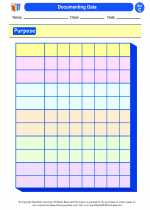What is Quantum Mechanics?
Quantum mechanics is a fundamental theory in physics that describes the behavior of matter and energy at the atomic and subatomic scales. It provides a mathematical framework for understanding the wave-particle duality of particles, the uncertainty principle, and the behavior of systems at the quantum level.
Key Concepts in Quantum Mechanics
- Wave-Particle Duality: According to quantum mechanics, particles such as electrons and photons exhibit both wave-like and particle-like behavior. This duality is described by wave functions and probabilities.
- Quantization: Certain physical properties, such as energy and angular momentum, are quantized in discrete units called quanta. This is a fundamental aspect of quantum mechanics.
- Uncertainty Principle: Formulated by Werner Heisenberg, the uncertainty principle states that certain pairs of physical properties, such as position and momentum, cannot be simultaneously known with arbitrary precision.
- Quantum Superposition: Quantum systems can exist in multiple states simultaneously, a phenomenon known as superposition. This is exemplified by Schrödinger's famous thought experiment involving a cat in a superposition of alive and dead states.
- Quantum Entanglement: When two or more particles become linked in such a way that the state of one particle cannot be described independently of the others, they are said to be entangled. This phenomenon has been the subject of much study and intrigue in quantum mechanics.
Applications of Quantum Mechanics
Quantum mechanics has numerous practical applications in modern technology and science, including:
- Quantum computing, which leverages quantum states to perform computations at speeds unattainable by classical computers.
- Quantum cryptography, which uses quantum properties to create secure communication systems.
- Quantum physics in medicine, such as in the development of MRI machines and other medical imaging technologies.
- Quantum mechanics in material science, enabling the study and development of new materials with unique properties.
Further Learning
To delve deeper into the fascinating world of quantum mechanics, consider studying the mathematical formalism of quantum mechanics, including wave functions, operators, and the Schrödinger equation. Additionally, exploring the historical development of quantum theory and its philosophical implications can provide valuable insights into this captivating field of study.
.◂Science Worksheets and Study Guides Third Grade. Science in our world - 3rd gr.
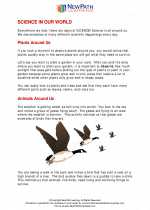
 Worksheet/Answer key
Worksheet/Answer key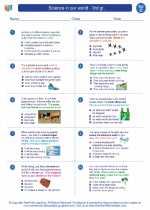
 Worksheet/Answer key
Worksheet/Answer key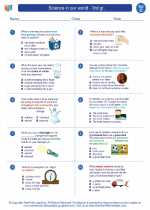
 Worksheet/Answer key
Worksheet/Answer key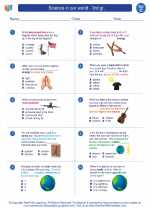
 Worksheet/Answer key
Worksheet/Answer key